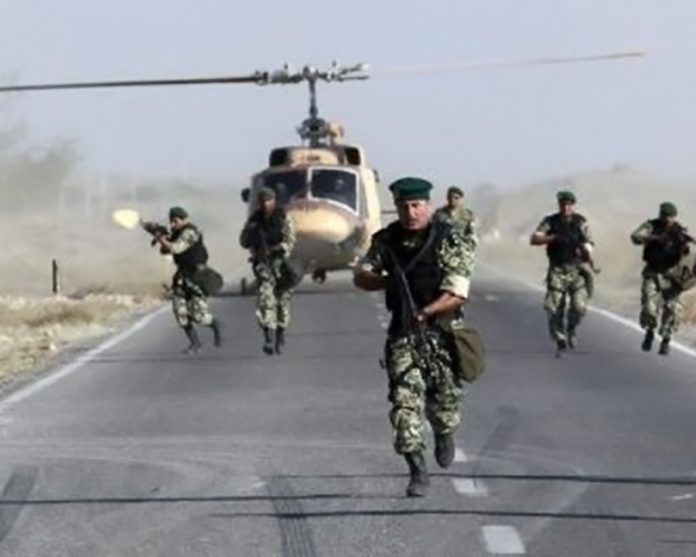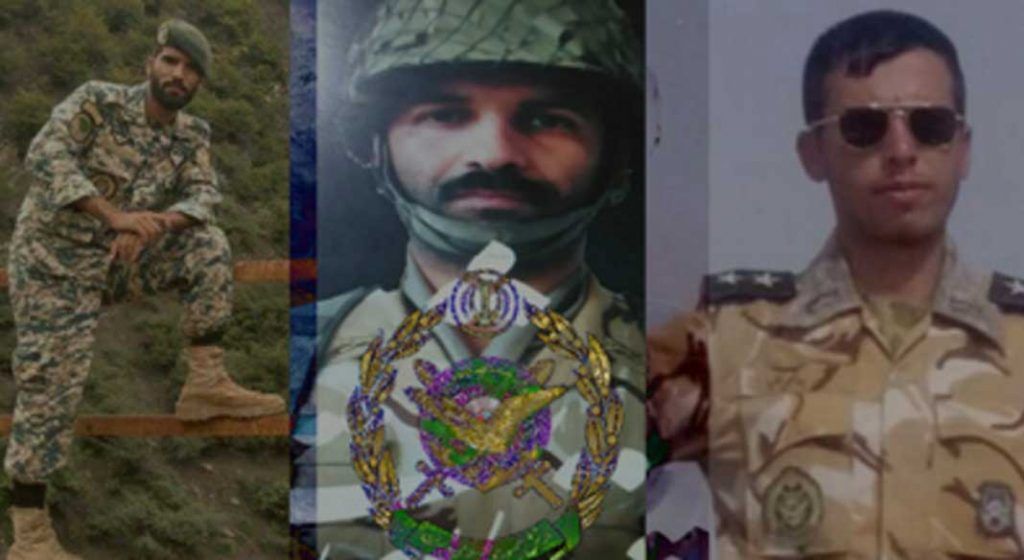Kayhan London Exclusive: IRGC hero-making operation increasing Iranian casualties in Syria
Thursday, May 19, 2016 For sometime now Iran has deployed the 65th Airborne Special Forces Brigade, known as NOHED, in Syria. This is in addition to the Islamic Revolutionary Guards Corps that have been fighting there. As such it has officially committed its army to the Syrian conflict.
There were some whispers, as far back as January 2013, regarding the deployment of the army to Syria. But at the time, these were just rumours which were circulating among the personnel and spreading through the word of mouth. In April of that year Ahmad Reza Pourdastan, the commander of the army ground forces, announced that although the Syrian army was strong and well-prepared, “ if needed, we can help them in the area of training”. Up to that point, only a limited number of missions had been carried out by the air force’s F-14 and MiG-29 squadrons, basically lending support to Russian bombers in Syria.
Kayhan-London has interviewed a NOHED officer about the deployment of commandos from the 65th Islamic Republic of Iran Army Ground Forces [NEZAJA] brigade to Syria. For safety and security reasons, we have not disclosed any name or personal information.
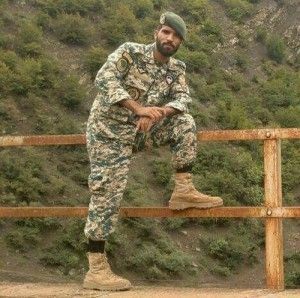
The public was puzzled by the deployment of the army to Syria, but you were ready for the move six months earlier! Would you please tell us what NOHED is and why has it been deployed to Syria?
First I should clarify that what many web sites refer to as army commandos, green berets and special forces are in fact the same force, namely the 65th Airborne Special Forces Brigade. It was given the acronym NOHED a long time ago. Its forces are stationed in Tehran and Shiraz. These forces undergo special military training which includes survival in hostile environment, free-fall and parachute drop and guerrilla and urban warfare. The training prepares these forces to deal with extraordinary situations. The NOHED forces were deployed to Syria after IRGC troops proved ineffective. They sustained heavy losses and many of them were captured. Any experienced military officer can see that the IRGC troops lack even the most basic training just by watching how they handle their weapons.
Are you saying that it was a mistake to deploy the IRGC forces to Syria?
I don’t view this event from a political perspective, meaning whether Iran’s presence in Syria constitutes a correct or a wrong policy. As a military man, I can tell you that the first IRGC troops that were deployed to Syria were of much higher calibre than those fighting there now. Those currently in operation in Syria don’t even know how to properly hold a weapon. They lack the basic understanding of camouflage techniques, fire and movement manoeuvre or how to even march properly and many other things. I am not saying it’s the financial issue, but it’s youthful enthusiasm and excitement that has motivated them to go to Syria.
So, what do you think is the reason behind it?
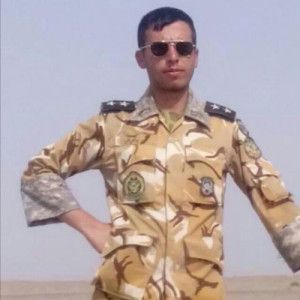
Hero-making! It was no different during the Iran-Iraq war. Any time the IRGC and Basij [volunteer paramilitary] forces were defeated and weakened – due mainly to bad or lack of planning – they would turn to the army for help. The IRGC’s disastrous Operation Ramadan (land-battle in July of 1982 near Basra during Iran-Iraq war) marks a black spot in Iran’s military history. IRGC commanders were using human shields against Iraq’s armoured divisions and infantry. Jumping on a land mine may be good propaganda but from the viewpoint of a trained military man it is utterly stupid. Operation Karbala-4 [Iran-Iraq war], under the command of Mohsen Rezaie [current secretary of the Expediency Council], was a major disaster of the Iran-Iraq war. It is inconceivable to go forward with an operation – not changing the date or even the time – when you know that the enemy had discovered your plan a week before the attack. The same with the [175] divers [who were reportedly buried alive during Iraq-Iran war] with their hands tied. In truth, a historical disgrace and mistake has become a propaganda tool. In his book on Iran-Iraq war, the former Egyptian Defence Minister [Mohamed] Abdul Al-Haili Abu Halal, describes Karbala-4 as the worst operation in the Iran-Iraq war from the military viewpoint of planning and manoeuvre.
There was no need to deploy army troops to Syria. Why were they sent there?
They have no choice in the matter. Troops are deployed based on the corpse and regional needs. Volunteers with special skills within the corps are given priority, but if there are no volunteers, then the troops must be deployed. But the process becomes a voluntary selection anyway, since there are a number of forces with various skill sets,
Speaking of financial matters, has any figure been discussed?
No. There are only rumours that have been going around. No one knows anything about it.There are no precedent for deploying troops abroad, and, so, we can’t even guess what is the pay for such missions. That being said, we’ve heard that it is in line with what the IRGC pays those on assignment.
Meaning that there are no extra benefits for being deployed?
It is not clear. Officers who have not enrolled in the advanced studies, have been told that they might not have to take those courses if they were to go to Syria. Any army officer who is reaching the end of his term as a captain and hopes to be promoted to the rank of major, must enrol in the advanced studies which are specifically designed for senior officers and last for a year to a year and a half.
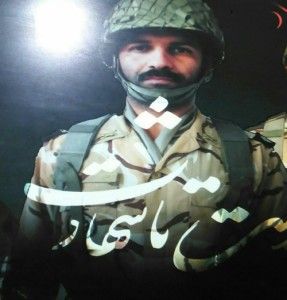
Is the advanced studies so difficult that would make it worthwhile to risk going to Syria?
The advanced studies is not difficult. Leaving your wife and child for a whole year is hard for officers. No one would ever risk going to Syria, if they could live in a better house and their salaries would cover their expenses.
Same complaint about the discrepancy between IRGC and Army salaries…
Salary is only part of the story. It is clear to the army officers and personnel that they are not trusted. Even if the funds were available, they would spend it on the IRGC. The best example of this is the creation of the IRGC Aviation Unit. Why create a parallel aviation unit when the existing Iran Army Aviation needs more funding? It costs money to buy helicopters from Russia, training, maintenance and management. Army Aviation doesn’t receive any support, meanwhile they create an aviation unit for the IRGC.
Do you think the deployment of NOHED could change the situation in Syria?
The reports that we receive from those on the ground don’t paint a positive picture. The army will probably suffer less casualties but will ultimately be forced to pull out of the conflict. This is a civil war where the division between the friends and foes is not clearly defined. America and Russia don’t have troops on the ground and, therefore, have not suffered as many casualties as Iran.
[responsivevoice_button voice=”US English Female” buttontext=”Listen to this “]

